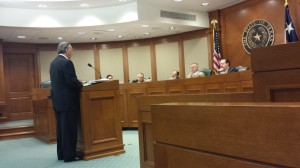Note: This story originally appeared on The Quorum Report. Join us there for daily coverage of Texas politics and government.
On Tuesday, lawmakers in the only state in America where workers’ comp insurance is optional are starting to take a hard look at whether that should still be the case. Texas House Speaker Joe Straus has asked the Business and Industry Committee to “study the voluntary nature of workers’ compensation in Texas and how it meets the needs of employers and employees.”
Those few words have the potential to spark a fight between employers who feel they’re often underbid because they offer coverage and those who would defend the system by saying, among other things, that a requirement to offer it won’t allow them to tailor a plan for their employees. Businesses that choose not to offer it are called “non-subscribers,” and they are required to give written notice of that each year to the Texas Department of Insurance.
Texas Association of Business Vice President of Government Affairs Cathy DeWitt said a requirement for all companies to offer workers’ comp insurance would be a real hindrance for most employers. “It would really be the demise of Texas business and our economy if we did that,” DeWitt said.
“There are a lot of businesses that do it (choose to opt out) because it allows them to tailor make a plan to their employees,” DeWitt said. “In non-subscription, you have to be way more careful and the whole premise is really to prevent injuries as much as possible,” she said. “The best way to avoid a lawsuit is for no one to get injured.”
As with many issues, the business community is not of one mind on this.
Testimony is expected tomorrow from, among others, Marek Brothers Construction President and CEO Stan Marek, who said that in his industry it is all too common for “unethical operators” to undercut his Houston-based construction firm by offering nothing in the way of accident insurance.” Marek said that when construction workers who are independent subcontractors are hurt they are “dropped off” at emergency rooms, which is without question the most expensive way to deliver care.
“Over at Seton, they’ll take good care of him and fix him right up,” he said. “But, do they call the owner of the building? No. Do they call the contractor? No. They just chalk it up to indigent care and then you and I get to pay for it on our hospital bills. That’s not right,” Marek said. “The workers need worker’s comp.”
Rep. Armando Walle, D-Houston, is on the committee and has pushed in the past for a limited requirement for workers’ comp specifically in construction.
Walle has singled out that industry “not because I meant to vilify contractors, but due to the reality that construction is just a more dangerous job than most other occupations. In fact, in Texas, workplace fatalities occur in construction at 4.5 times the rate of all other lines of work.” His intent has been “to increase worker safety, while ensuring access to health care for injured employees, reducing the costs to the taxpayer for uncompensated medical care, and returning rehabilitated workers back to work,” Walle said.
Despite the disagreements that will naturally arise as the committee works through this, Dewitt – the TAB vice president – said that she’s glad the panel will be getting this update during the interim. A lot of institutional memory on the issue has left the House since the current system was adopted, she noted. “There are a lot of relatively new members on Business and Industry,” she said. “This is a good time to go over everything.”
Copyright April 21, 2014, Harvey Kronberg, www.quorumreport.com, All rights are reserved. Reprinted with permission.


